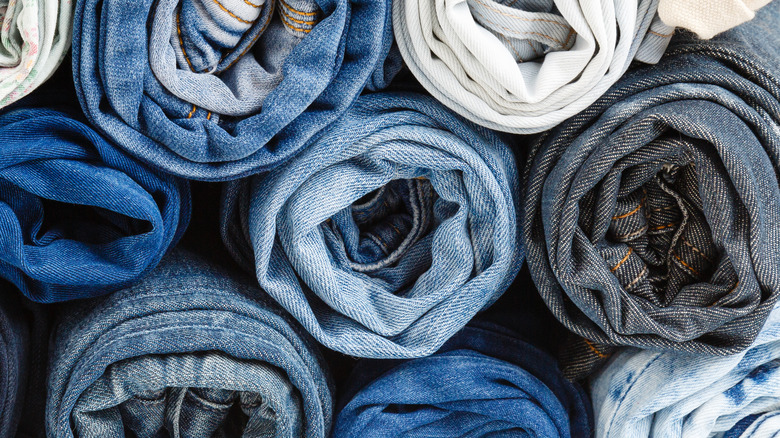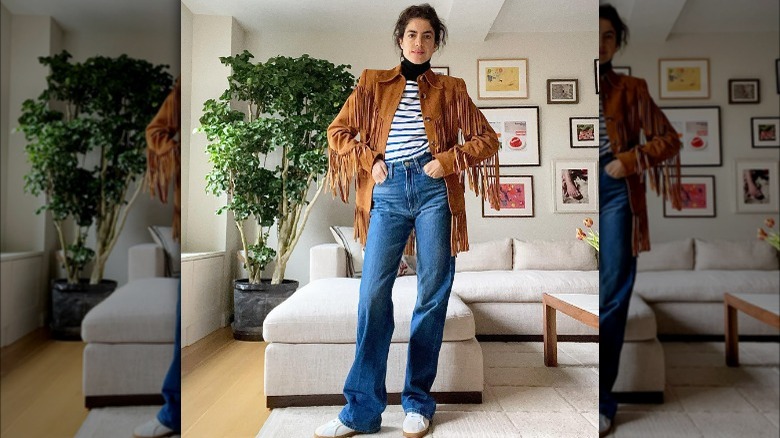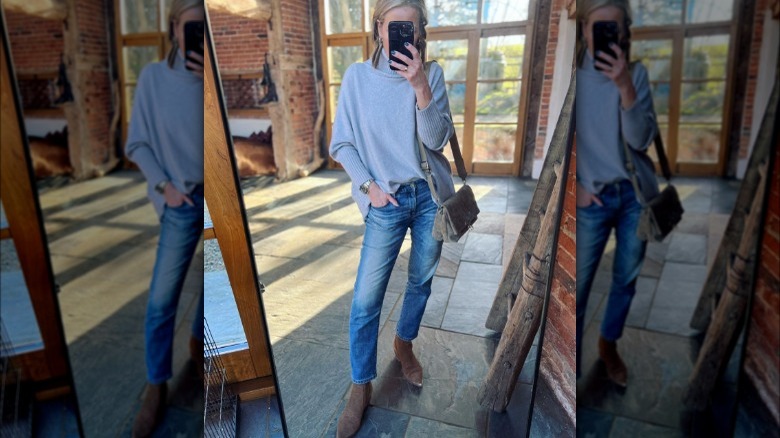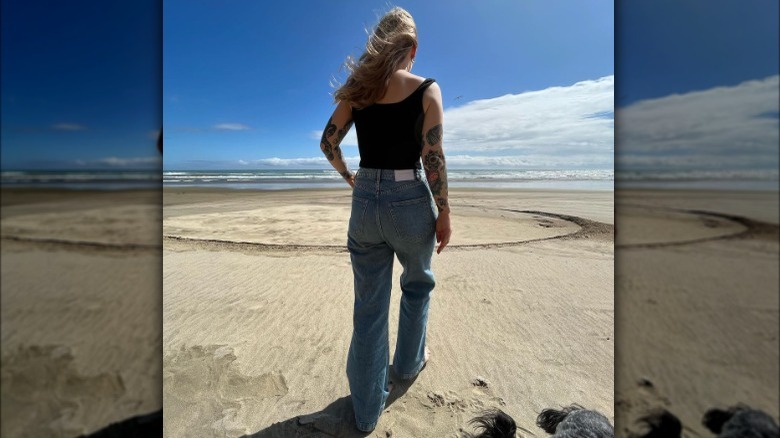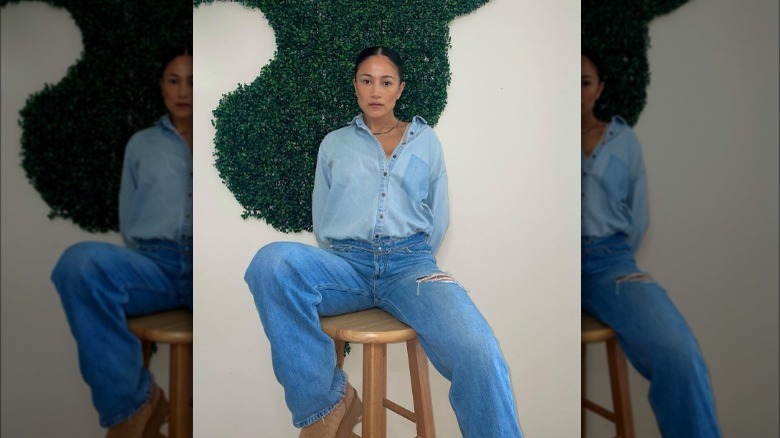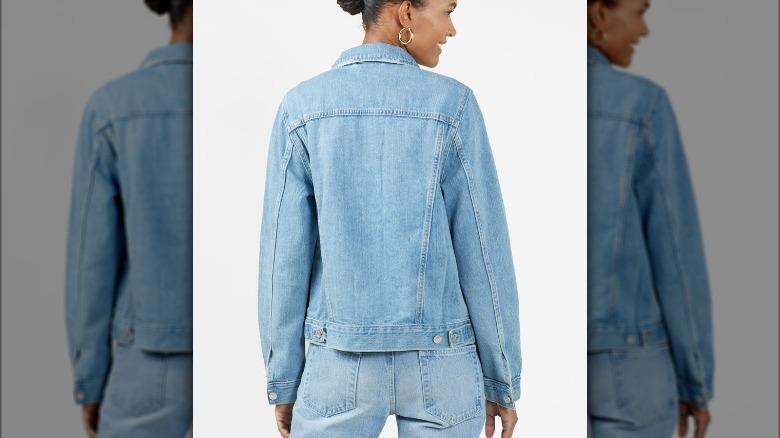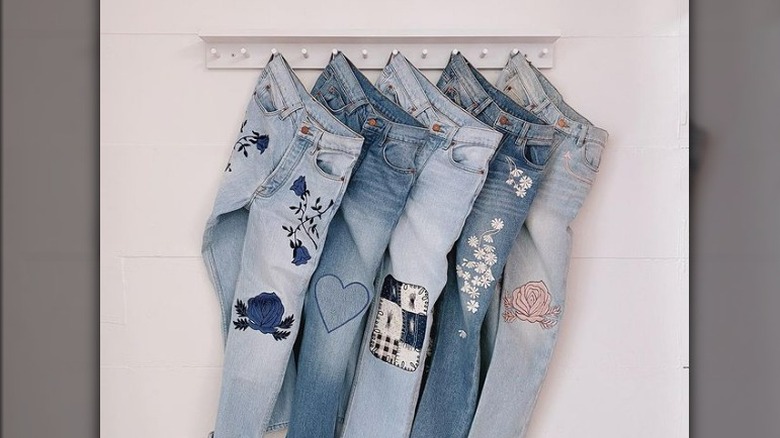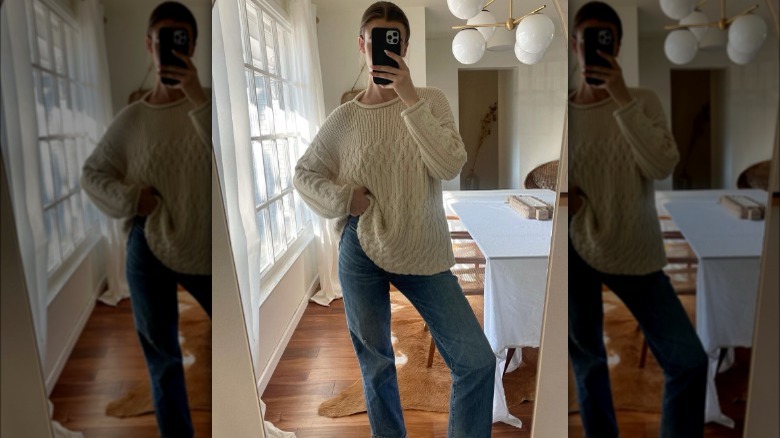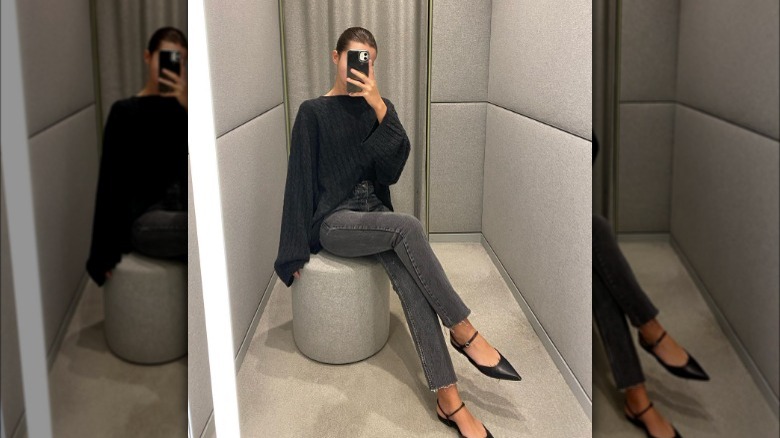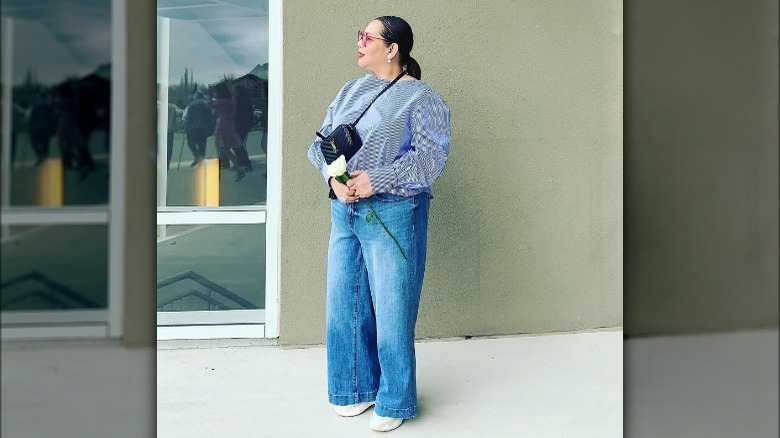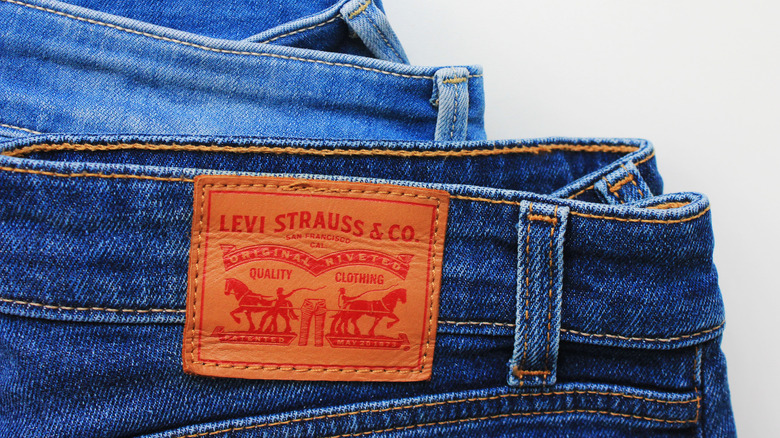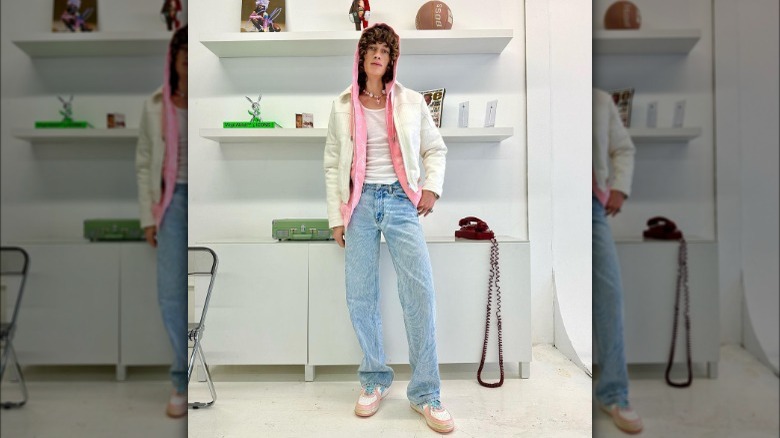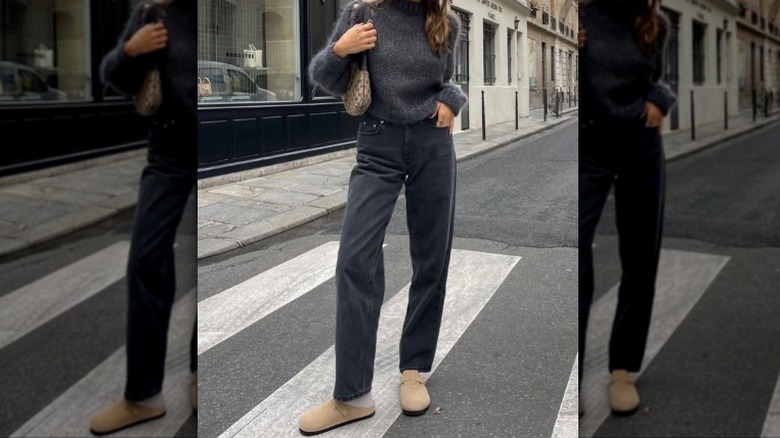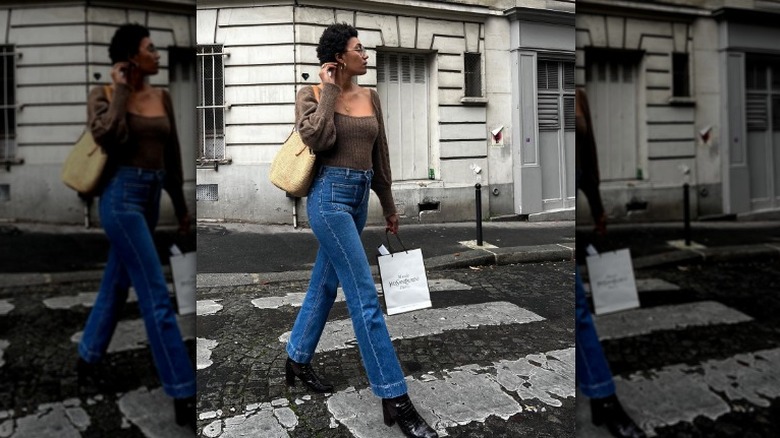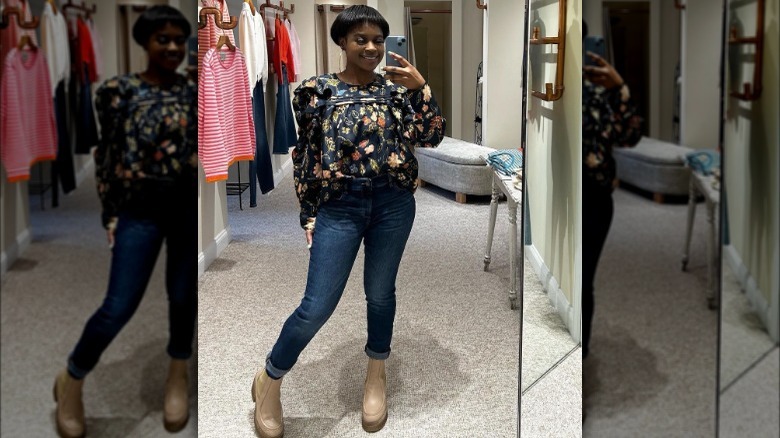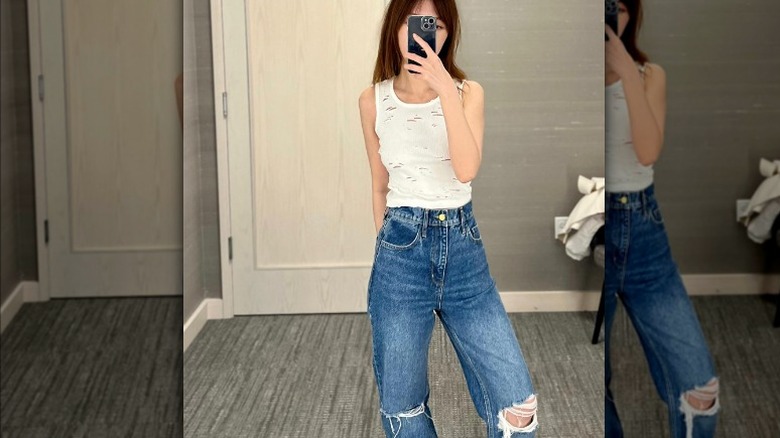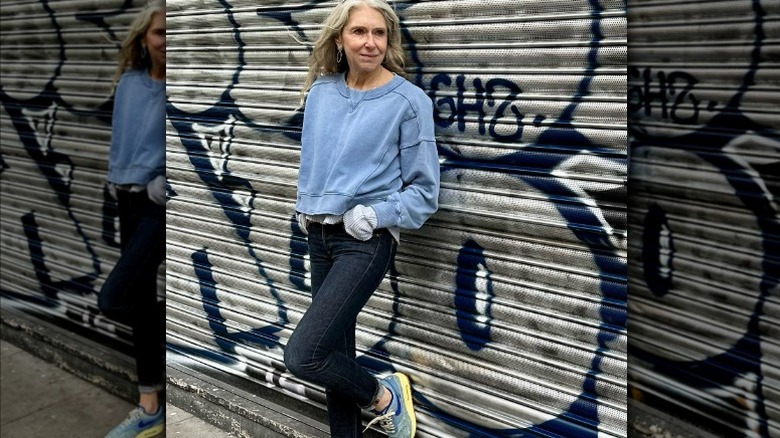16 Sustainable Denim Brands That Merge Ethics And Aesthetics
Who doesn't love a little denim? Almost everyone owns a pair of jeans, from blue to black and everything in between. There's no denying denim is an absolute wardrobe staple — so much so that there are even songs about the material. From Carrie Underwood's "Denim And Rhinestones" to Maroon 5's "Denim Jacket," and Ginuwine's "In Those Jeans," denim is so good it's sung about. But while all the iconic material might make for a great song, it's impact on the environment isn't exactly something to sing about.
Creating one pair of jeans can require as much as eight gallons of water. To put that in context, that's how much the average household in the U.S. uses in around three days! But that's far from the only issue with producing a pair of the iconic pants. Per Glamour UK, it's estimated 2 million tons of chemicals are used to produce the 2 billion pairs of jeans made around the world every single year, as well as an estimated 1.4 million tons of raw cotton. With the demand for jeans being so high all over the globe, its production can lead to serious ethical issues, such as low wages and poor working conditions, as companies try to provide as many different styles for minimal cost.
But thankfully, not all companies are the same. There are some brands doing good out there, and we're giving a big pat on the back to these businesses that are all about aesthetics, ethics, and sustainability at the same time.
Frame is framing the future
Los Angeles based brand Frame is really doing impressive things when it comes to sustainability thanks to its Responsible Denim Program. The initiative ensures all of its denim products are made out of eco-conscious fabrics and fibers that are either recycled or grown organically via a microplastics-free process. The company also makes use of water-saving wash processes to combat the staggering amount of H2O it takes to create a standard pair of jeans. As of now, they claim to only using 2% of the industry standard for water waste. Even cooler, Frame has developed technology that makes stretch denim biodegradable. Pretty neat!
Another added bonus? The zippers in the garments are made from 100% recycled poly tape and can be cut out of the jeans so the pants can become degradable. On top of that — and this is the modern part we really love — the company is making use of digital technology by providing customers with QR codes that contain all the details about their garments, thus preventing the need for stitching on unnecessary labels. Any denim fan will be happy to know they offer several different cuts of jean and other garments, too.
Additionally, in March 2022, the company donated 10% of its net profits from Pure by Frame to Water.org, and, in 2019, gave 20% of online profits to Baby2Baby.
AG is A-OK
AG is doing denim right. First founded in 2000, the company has seriously upped its game when it comes to cutting its carbon footprint. Amongst its major achievements in going green is the two water filtration systems it introduced to its manufacturing process in 2019, which recycles the wastewater produced by its factories in Los Angeles and Mexico. Using that same technology, AG has been saving an impressive 100,000 gallons of water a day. The business' green initiative started back in 2010 when it began using ozone technology, then, the following year, it installed eco-friendly lasers to support the production of its products. But don't think that's the end of AG's big green efforts. Oh, no. In 2014, the company updated its drying systems so that 50% of the heat used to dry its denim at one time can be reused again, and in 2016, it installed solar panels at its headquarters, which means that it currently powered by 30% renewable energy.
As for what you'll physically be able to see and feel in terms of sustainability if you treat yourself to a pair of AG jeans, the company uses hemp and Tencel Lyocell in the material, while the metal or plastic button you're used to seeing in other brands is replaced by Corozo. You can get their super stylish jeans in all different cuts, as well as a full range of other clothing items and accessories.
Outland Denim is truly leading the way
Outland Denim has an admirable focus on both ethics and sustainability that goes all the way back to when it was founded in 2008. We adore the fact that the company was actually founded as a way for sexual exploitation survivors to rebuild their lives, as founder James Bartle offered employees coming out of difficult situations a steady job with a focus on training, education, and appropriate wages. It also works closely with its partners to ensure they're not promoting an exploitative work environment. No wonder Meghan Markle is known to be a fan! In fact, Bartle shared in a 2019 blog post that after the Duchess of Sussex was seen publicly sporting Outland Denim's black Harriett Jean, it brought a level of attention to the business that enabled them to hire 46 seamstresses in Cambodia.
But while that's all very remarkable, Otaldnt also all about sustainability too when it comes to its garments, which (in addition to jeans, of course!) includes the likes of jackets, t-shirts, skirts, and dresses. The business makes use of organic cotton, which is farmed without agrochemicals and uses less water, to create its jeans, plus it's developed its own wash and finishing facility to cut down on emissions.
Ética is ethical
It's all in the name with Ética, a Portuguese word which actually translates to mean "ethic." This impressive business has made sustainability the forefront of its business model, working hard to develop its wash techniques to reduce its carbon footprint, as well as focusing its efforts on sourcing sustainable materials. And all that scouring has certainly paid off. Per the company's website, Etica uses fewer than half of the amount of chemicals, water, and resources as competing denim brands do to produce a single jean.
In addition to all that, the company recycles its water to be used locally on farms, and also compresses its used wash stones to make bricks that are donated for low-income housing. That means it's a company you can be proud to sport.
Founder Chelsea Santry opened up to Forbes about her business' ethos in 2019, explaining why she decided to merge ethics and sustainability with stylish clothing. "I believe it is our job to do better for our planet and for mankind," she explained. "It is what we should all strive for, to challenge ourselves and our companies to try things differently, to challenge the norm and to show consumers and industry insiders that things can be done differently without having to compromise quality or style." We couldn't have put it better ourselves!
We know Outerknown is all about the ethics
Founded in 2015, Outerknown has also managed to keep more than 1,800 garments out of landfill as a result of its resale platform — which is something there just can't be enough of in the fashion world! It uses eco-friendly materials rated via criteria that determines how earth friendly the fibers are based on the sustainability and circularity potential and boasts sourcing from eight facilities that run on renewable energy.
Offering classic fits like flare, skinny, and slim fit, as well as trendy wide leg jeans in shades like Vista Blue and Lavelette, the jeans are ideal for anyone who wants a classic, high quality look.
Outerknown also boasts an impressive array of items outside of denim too, meaning you can stock up your wardrobe while clearing out that consumer guilt. In addition to its fabulous array of denim products, the company is also famous for its insanely comfy blanket shirt.
Bliss and Mischief is far from mischievous in its sustainability
Isn't it amazing when something totally new is made from something totally old? Well, that's where Bliss and Mischief is thriving. The company's niche is in sourcing deadstock (that's material and products other companies may have bought or produced too much of that they're unable to sell) and making the discarded material into something stylish that doesn't have a heavy impact on the earth. Founder Hillary Justin actually found her stride taking old denim, including used Levis, and stitching brand new motifs onto them to make them totally bespoke. The brand's unique jean stylings feature creative printed designs that can't be found anywhere else.
The company keeps things local in California, as the items are all designed, sewn, and hand-detailed in the state. Justin made the conscious decision to keep production of Bliss and Mischief's unique garments local as well by employing sewers and manufacturers in L.A. — that keeps the company's carbon footprint to a minimum by cutting down outsourcing across oceans.
"I think with this industry, and for all of us, balance is key," Justin told Honestly WTF of her brand's sustainability practices. "For example if we choose a beautiful fabric that's made in Japan, we make sure it's not something we also have to dye once it gets here. My policy is do what you can when you can — from using your own cups, or totes, to picking up supplies locally vs having them shipped."
Oliver Logan is all about going green
Oliver Logan makes its jeans and other clothes from reclaimed fibers, like yarn and organic cotton, that have been collected from ethical factories and would otherwise go to waste, preventing tons of discarded clothing from ending up in landfill. It's also dedicated to creating less carbon dioxide emissions when making its stylish and earth friendly products through sourcing textiles from factories that use renewable energy sources, as well as denim mills using special fabric finishing technology that lowers water consumption. Since it first started in 2018, the LA based brand has conserved 89,016 km of driving emissions, 13,348,767 days of drinking water, and 21,229,865 hours of bulb energy. Now that's working to save the planet!
"[I] observed that more often than not, the consumer had to choose between quality, sustainability, style, and price," Oliver Timsit, founder and CEO of Oliver Logan, explained to My Brand Journey of what inspired the business. "I wanted to create a brand that could deliver all of those things in each product that we make."
We also love the way Oliver Logan's jeans are size inclusive and come in a range of styles, including tapered, relaxed, and wide leg. The company displays it items on its website using three different models, showing its clothing really can be rocked by anyone.
E.L.V. Denim is giving denim another life
Founded in 2018, E.L.V. Denim has spent its life making use of items that would otherwise be sent to landfill, by creating new jeans with denim that already exists. How cool is that? The company sources its material from vintage warehouses across the U.K., while its founder, Anna Foster, ensures each garment has the lowest carbon footprint possible from start to finish by keeping production as local as possible. Foster also involves their London community in her business by visiting a local launderette to clean the products before selling them, while ensuring only seven liters of water is used in the washing process. That's one thousandth of what it can usually take to create a brand new pair of jeans!
But it only gets better. Any denim that's leftover from the garment making process goes into either making denim artwork or is donated to local schools and universities for textiles classes. Now that's a business model we can get behind!
The concept came to Foster after she learned just how unsustainable the denim industry really is. "For me sustainability was the only option," she told The Vendeur. "I knew it was really important, and possible, to make as much of that existing denim material viable again as possible. To right the wrongs of the past in a positive way."
Warp + Weft is working hard
Warp + Weft is over three decades old and has done so much to increase its sustainability practices over those years. For one, the company thrives in cutting down its energy usage, using only 10 gallons of H2O to create a pair of jeans instead of the whopping 1,500 gallons which is typical for a regular new pair. The company can boast that it has saved 572,400,000 gallons of H2O over the years. The family run company also recycles and treats 98% of the water it uses in its vertical manufacturing model, implementing unique technology called Dry Ozone to eliminate the need for chemical bleach that can be damaging to the environment. There's clearly ethics on the brain here too, as Warp + Weft ensures its facilities abide by International Social and Environmental & Quality Standards, vowing to offer its workers a safe and happy environment, including fair wages and reasonable working hours.
But while Warp + Weft is one of our favorites for its efforts keeping things green, we also love how inclusive the brand is. Pretty much everyone is represented in the brand's sizing, as it proudly offers 75 different sizes across various shapes and heights, allowing for a range of people to sport stylish denim while supporting eco-friendly practices.
That Levi's longevity
We know, Levi probably isn't a company you were expecting to see on our list. It's not often that a company as big and old (it was founded way back in 1853) as the denim leader is commended alongside smaller businesses for its green initiatives, but it turns out the brand most synonymous with denim is also one leading the sustainability charge. In 2021, Levi launched its Buy Better, Wear Longer campaign, which encouraged consumers to make smarter choices. That included urging consumers to wear their jeans for longer instead of investing in a new pair, buying second hand products, and using Levi's patching up service which repairs ripped items. Now that's not something you see every day from a multinational company!
Levi is also focused on climate, consumption, and community, which includes using less water through its WaterLess campaign. This initiative has helped the business save more than 13 billion liters of water since 2011 by implementing a rule that Levi factories must recycle at least 20% of the water they use. Levi has also updated its factories to use LED lighting and natural gases that reduce their impact on the environment.
Unspun is spinning into control
Unlike the vast majority of other companies, San Francisco brand Unspun only makes one product at a time in order to reduce waste and ensure each product made will actually be sold and not produce any waste. That means each customer receives a totally unique and custom jean (it uses 3D scanning to properly tailor the jeans to your body) made of recycled fibers and organic cotton. What a cool idea! Unspun also makes use of 100% vegan fabrics and incorporates local manufacturing to keep jobs in California, while cutting down on carbon emissions at the same time. So it's basically a total win-win.
Because each item has its own space and time to be created properly, Unspun ensures its products are well-made enough that they can be worn for years to come — no questionable ethics fast fashion here, guys! As if that wasn't enough, the business also ensures any wastewater created is treated and recycled, while making a point to stay away from using any chemicals that could be harmful to the environment.
Boy, is Boyish working hard
Almost nothing goes to waste with Boyish. The denim company is dedicated to sustainability through various methods, which includes recycling the entirety of its cutting waste, using recycled paper for its tags and recycled metal for its hardware, as well as sending out its orders to customers in plant-based bags. But before it gets to that point in the process, Boyish recycles its water and uses dyes made out of natural plant extracts to reduce its impact on the environment and stop toxic chemicals from damaging people and the earth. Its products are also made from recycled cotton to cut down on how much water the company actually needs to make each jean.
As if that wasn't enough to convince you of Boyish's sustainability cred, the brand saves an impressive 10,000 pounds of CO2 emissions each year by using vintage rolls of fabric rather than creating new ones. After all, all's old is new again!
Since it was founded in 2018, Boyish has also been dedicated to treating those it works with in an ethical manner, which means making its suppliers sign a Code of Conduct which guarantees workers will be paid more than minimum wage and performing regular audits on its partners. Ethics and aesthetics, for sure!
There's nothing muddy about Mud Jeans' sustainability practices
How's this for an impressive feat? Mud Jeans is the creator of the very first pair of jeans made from 100% post-consumer recycled cotton, and it prides itself on being the world's first circular denim brand, which means they don't use any synthetic blended materials (via Fashion United). So, it's no surprise it made this list, right? But that's not the brand's only big impact on sustainability. The 2012 founded brand combines using GOTS certified organic cotton and post-consumer recycled cotton to create its jeans. That has lead to some very impressive stats coming out of Mud Jeans' HQ. So far, its sustainable practices have prevented over 61,000 pairs of jeans from ending up in a landfill, and in 2021, allowed the company to save 311 million liters of water.
We, of course, love all that, but we're particularly excited about Mud Jeans' initiative that actually lets you rent your jeans rather than handing over a big bulk of money all-in-one ago. Instead of purchasing a new pair on the spot, it's Lease A Jeans initiative lets you pay around $10.71 a month over 12 months to lease a pair of jeans, then they're yours. When you're done with them, you then send them back to Mud Jeans who recycle them for you. Now that's ethical thinking!
DL1961 has sustainability at its core
First started in 2008, DL1961 is another company that's focused on transforming old things new, shredding old denim and post-consumer waste and weaving the fibers into new yarn to make a totally new denim product. Once a new garment has been created by the business, waterless laser and Ozone technologies create the finished product, and voila! They have a brand new jean. That means there's significantly less water involved than many companies making fast fashion jeans. It only takes the company around 10 gallons of water to make its jeans, which is much, much less than the 1,500 gallons it takes the average company to do the same. 98% of the water that's leftover is then treated and recycled at an in-house treatment plant.
That sustainable mindset continues into DL1961's factories, as the company has adopted solar power and renewable energy so its locations can cut down on the use of fossil fuels. Ethics is also a top priority, as the business is committed to only working under International Social & Environmental Quality Standards to ensure those who work in the factories are paid fairly and have good working conditions.
One of our very favorite things about DL1961, though? As well as the finished product looking oh so stylish, it has its own fund called The Pantry. The do-good initiative sees the business donate a portion of it sales every single month to charities and shelters for houseless people around New York City.
You need to try Triarchy
Triarchy is another company doing amazing things to keep ethics alive in garment production. After all, it even has its own biomimetics department that provides education on how jean production can be kinder to the environment. "After a few years of making jeans traditionally, it became very apparent to us how irresponsibly denim was made. Water usage was abhorrent, chemicals were everywhere — it was a disaster," Adam Taubenfligel, Co-Founder, Creative Director, and Sustainability Steward for Triarchy, explained to Medium. "We all agreed that the world didn't need another traditional denim brand."
Just some of the big things Triarchy is doing to keep things ethically impressive and sustainable at the same time? The company only uses responsibly farmed and recycled fibers, including organic cotton, natural rubber, and Tencel to create its products. It also boasts its own Atelier Denim line, which takes apart vintage denim, sanitizes it in sustainable ozone machines, then creates something stylish and fabulous out of it. The process also makes use of environmentally friendly dyes that contain 80% less sulfates than traditional colorings, as well as specially formulated Indigo and even clay. Yes, clay! In addition to all that, Triarchy uses recycled waste, recycled metals, and paper products for the jeans' tags and hardware, and ships its items in compostable bags.
Nudie Jeans sustainability is laid bare
Want free jean repairs for life? Well, that's exactly what Nudie Jeans is offering as part of its remarkable sustainability plan. We love that this brand is already making products with materials that feature at least 70% sustainable fibers, like organic cotton, but what we love more is that it's going the extra mile to cut down on unnecessary buying by ensuring its products can be worn for years to come.
Currently, Nudie Jeans also offers customers a free repair kit, which lets people fix their jeans at home. The double benefit here is there's no need to create a big carbon footprint by driving to a store, nor any need to purchase any new items. Now that's a win-win! The company also boasts an inspiring recycling program, transforming pieces of old, donated denim into patches that are used to repair ripped items. Customers who hand over their used jeans for secondhand resale can receive a discount on a new pair for the future.
But it's not just about the effort Nudie Jeans is putting into its products that makes them a standout. The business is also ensuring all those working with and for the company are treated fairly via its minimum wage efforts, proving ethics is also at the top of this company's priority list.
